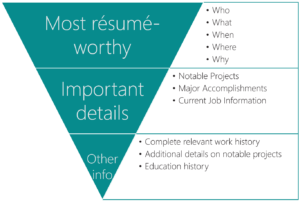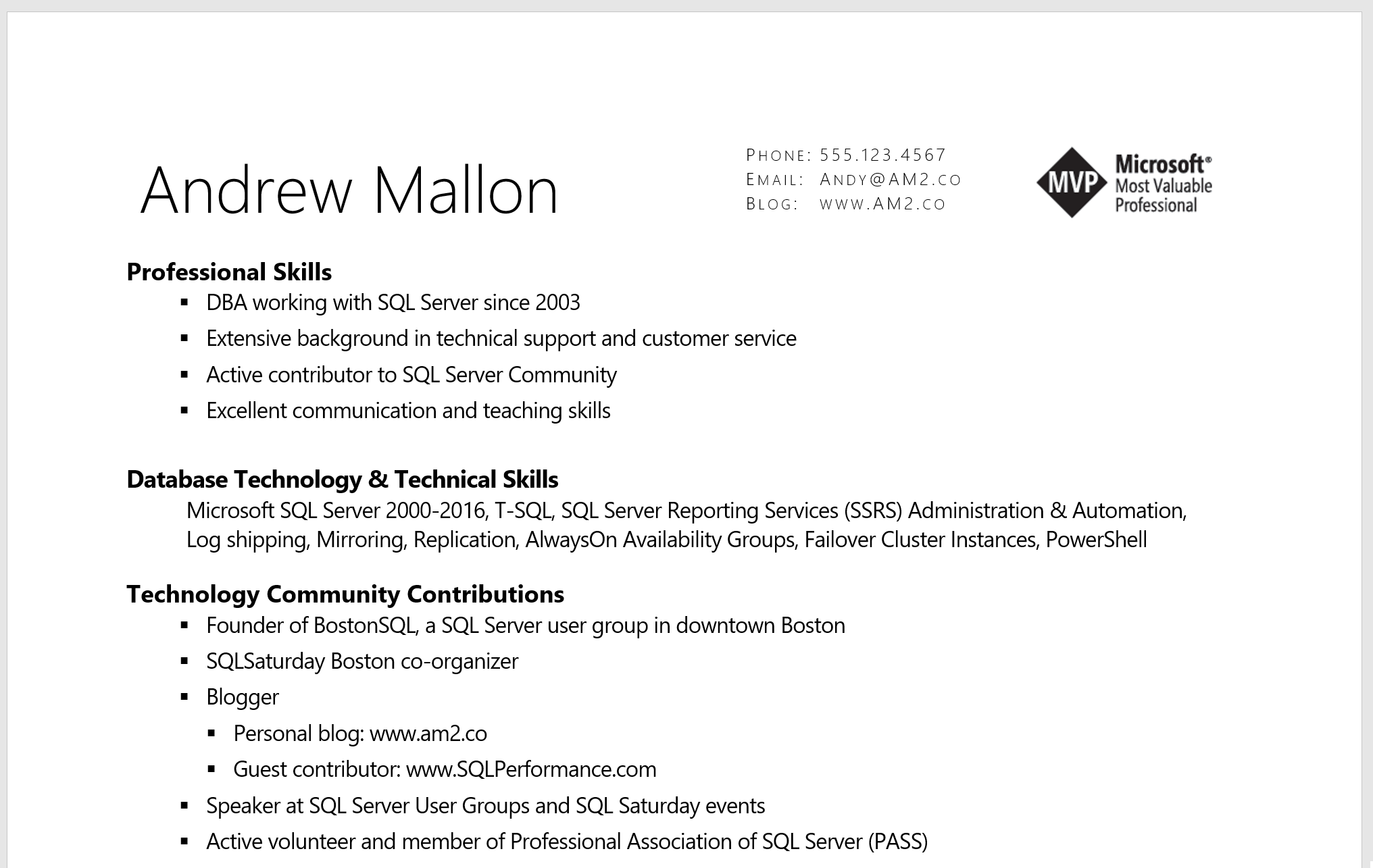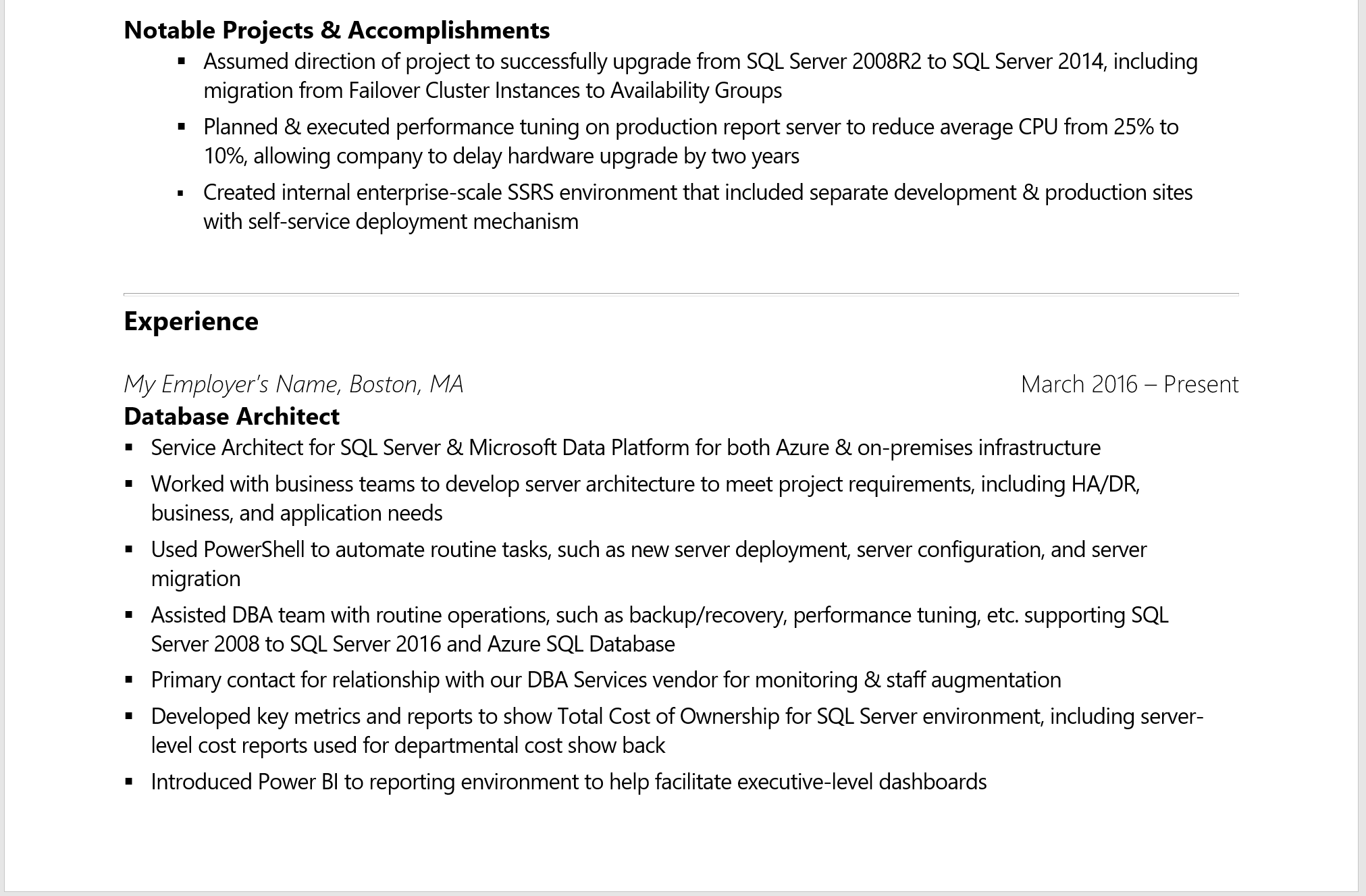Writing a good resume is hard. People will tell you lots of rules about what you should always or never do with your resume. Should you follow those rules? Are things different because of your industry/background/geography/niche? Should you be clever or classic? It depends™.
There is one important thing to keep in mind for your resume. This tip is not a rule, but it is a universal fact. Whether you’re a battle-scarred IT veteran, or a fresh-faced college grad, keep this one tip in mind when you read or update your resume.
Nobody wants to read your resume
Resumes are an important part of the job-hunting process–but think about how they are used. Job-hunting websites have millions of resumes posted. Recruiters and HR departments read hundreds of resumes every single day. Hiring managers already have a full-time job, and their team is shorthanded–and now they have a stack of resumes to review and pick their favorites.
Don’t make it hard for a hiring team to find you. Don’t make it hard for them to find out about you. If you put in the work to make your resume easy to read, you’ll make it easier for the hiring team to discover you and to like you.

Write your resume like a journalist
In journalism, there is a concept of writing stories in an inverted pyramid. The most essential, newsworthy facts go first. In the first couple of seconds of reading a news article, you should get the gist of the Who/What/When/Where/Why of the story. Next, the journalist conveys all the important facts and starts to fill in the detail. Background information, minutia, and less important details are saved for the end of the story.
Most people only read the first half of a news article. With paper newspapers (remember those?), when a front-page article continues to another page, most people don’t “make the jump” to finish the article. Think about that–the most important news of the day, and people don’t finish reading the story. Readers are lazy. We want information spoon-fed to us. We don’t have patience for details.
Your resume is no different. Most people won’t finish reading your resume. Most people won’t even move on to the second page of your resume. You have to get as much information to your reader, as fast as possible, and as easy as possible.
Assume that a recruiter and hiring manager only have the first page of your resume.
- Do they have all the information they need to decide to call you in?
- What if they only read the first half page? Maybe they open the Word document & never scrolled down. Did you get them all the important information?
One page? Page one.
One of those much-disputed resume rules is “Your resume should only be one page.” I don’t think I’ve ever seen a DBA with a one-page resume. I’ll leavethat debate for another day, but my resume is certainly longer than one page. However, I do think that the first page is the most important. Remember–most people will never read past page one. Use the inverted pyramid method to get the most important facts onto the first page. The rest of your resume is for background information
Most newsworthy facts first
Use the first half-page of your resume to convey that top level of the pyramid. Convey the most newsworthy (resume-worthy?) facts to the reader. Who are you? What do you do? Where are you in your career?
What technical skills do you have? What languages do you code in? What technologies do you know? Use restraint here–If the technology isn’t relevant to the job you want, or the story you tell, don’t put it in this part of your resume. I worked with Oracle for a number of years, and am pretty decent (dangerous) with PL/SQL, but it’s not one of the most important skills I have–I can mention that detail later and not in this part of my resume.
Here’s what the first half page of my resume looks like. I’m really comfortable that if a recruiter sees this and doesn’t continue reading, he or she has made the right decision:
Other important details
I’ve got about a half of the first page left to get across the other information that I find most important. What are the “important details” you need to mention on your resume? For me, this is the time to discuss specific projects and accomplishments that I have done as a DBA throughout my career. I basically want to pull some of the bullet points from further down on my resume, and push them into the top of my resume. It’s also really important for me to talk about my current job–what I do every day right now is a pretty important detail.
The next half page of my resume has a section for a few of those most important bullet points, pulled out of various jobs and pushed to the first page. Then, I fit in my current job before I run out of space. Take a look:
Background info
The rest of my resume lists out additional relevant work history. Every time I update my resume, I re-read the old job descriptions. I start to edit out things that might have been important at the time, but don’t seem so important anymore. I cut out things that are repetitive, or inclusive in another bullet point. I know that anyone who makes it to page 2 is losing interest, so my goal is to get information across to them without being overly tedious or boring. Be complete, but be concise.
This is where you can mention all those other technologies and languages that you’ve worked with. Under the job where I used Oracle and wrote PL/SQL, I include that information on the bullet points under that job on Page 2. It’s relevant, but for my career, it’s not really that important.
Starting on Page 2, you are filling in the background of the story you started on Page 1. You’re filling in the details, backing up the important details, and getting the reader more interested in you. As you fill in the details, just keep in mind the most important thing: Nobody wants to read your resume. Get the reader the info they need to know, so that they can call you and schedule an interview.


On one-pagers, I’m pretty darn proud of mine and it’s available for reuse (of the style, not my details 😉 ) if folks want to give it a go
I also structured it back when a I was a permy so I upfronted all my speaking and organising. If someone wasn’t going to support that then I wanted them to discount my CV before wasting my time at interview.
https://www.overleaf.com/articles/steph-lockes-one-page-cv/wbttfmfqcdtq#.WWOOc4jytPY
That’s a fantastic one-page CV. (I keep mine at two pages…) But I’ve given up on trying to convince people to keep their resume short. I figure I can at least convince them to make the first page great.
When I reviewed CVs, I’d spend 75% on the front page and 25% on the second so if there was anything pertinent on pages 3-10 I wasn’t gonna see it. Communication skills are always a high priority when I look for candidates. A rambling CV is a sign that they don’t give thought to structuring communication to maximise impact so they get minus points per page in the “Will I interview them?” game.